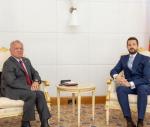You are here
The Middle East and American public diplomacy
Feb 21,2019 - Last updated at Feb 21,2019
In a hyper-connected world, public diplomacy is very significant for any country and is in line with soft power to win hearts and minds. Thus, public diplomacy is defined as a thoughtful communication endeavour to make use of soft power, by providing information deemed by foreign audience as positive. Public diplomacy is sometimes defined succinctly to refer to reaching out to global publics directly via micro approaches, including NGOs, such as the Peace Corps, and macro levels by relying on mass media.
Over the past decade, there has been a worldwide surge of public diplomacy and its use as one of the most influential and sustainable soft weapons. Governments have decided to appoint departments and officials to devise strategies to yield the best results. The term has become a revolution in the world of contemporary diplomacy alongside the traditional, cultural, virtual diplomacy and so forth.
The concept of public diplomacy was first used in 1965 by Edmund Gullion, dean of the Faculty of Law and Diplomacy at Tufts University. Since then, public diplomacy deliberately has been dealing with the implications of public attitudes on foreign policy and their implementation, and has sought to create public opinion in other countries away from traditional diplomacy.
Although the ultimate objective of public diplomacy is the same goal as traditional diplomacy, it can be said that the difference between them is based on the change in language of discourse and the type of instrument used. If traditional diplomacy is marketed through ministers, radio and journals, public diplomacy has now transcended this traditional trait by focusing on political values, national events, culture, religion, language, human rights and others in a way that has made means of diplomacy more effective at the level of influence and aspired objectives.
In terms of American public diplomacy, it is a must to resort to various channels to do that, including holding cultural events, sending American musicians and singers, hosting American plays, organising art expos, educational conferences, media exchanges, book fairs, foreign student and professional exchanges and the translation of American literature into Arabic to demonstrate facets of American civilisation.
This has helped the US defeat radicalism and terrorism, as these two aspects cannot be defeated by arms alone. What Washington needs is to adopt a strategy of war of ideas against radicalism through emphasising dialogue with Arabs and Muslims, by providing mechanisms for both Americans and Muslims to talk to one another. The second is to enhance objective facts over propaganda. The third is to counter extremist and terrorist narratives in a direct manner. The fourth is to resort to NGOs to address malignant and spiteful ideas worldwide. Fifth, the US should embrace a beefy plan to inhibit conflicts involving Muslims as part of a war of ideas strategy.
Arabs and Muslims still remember the influential speech of Barack Obama in 2009 in Egypt as he promoted American policies, which made him popular in the region. The beautifully written speech had promised support and backing to the Palestinians. Obama said: “Let there be no doubt: The situation for the Palestinian people is intolerable. America will not turn our backs on the legitimate Palestinian aspiration for dignity, opportunity and a state of their own.” This has made Obama very popular amongst Arabs.
In 2004, an opinion poll, which took place in Jordan, the UAE and Morocco, revealed that the public had favourable views of American civilisation, education, media, cinema, culture, science, medicine, technology, products, democracy and freedom. According to the 2004 poll, Arab publics had an unfavourable opinion of American policies towards Arab causes, including the Palestinian issue.
For her part, former US secretary of state Hillary Clinton delivered a speech called “Arrival at the Department of State” on January 22, 2009, in which she compared her country’s foreign policy with a stool with three legs: defence, diplomacy and development, pointing out that robust diplomacy and effective development are the best long-term tools for securing the US future.
After 1991, the US started to focus on public diplomacy, or citizens’ diplomacy, in the Middle East and North Africa (MENA) region to rehabilitate the American image to win over people’s hearts and minds, as it is impossible to realise American interests in the region without influencing the civil society due to the majority of the young people in the demographics of the MENA region. To do so, the Americans have resorted to strategic communication, using social media, information technologies and some other channels of public diplomacy to promote their foreign policies.
In the post-9/11 era, American individual clout and organisational ability to shape US future policies have become apparent. As one can notice, more than ever, the outstanding triumphs of its civic foreign servicemen, who have achieved more than the government in obtaining outstanding results. The need to build public diplomacy and a soft, organised, effective and accurate force has become very necessary, especially as they represent a powerful and decisive dynamism in the foreign policy of any country. Today, the international system is no longer based on the same old foundations on which relations were established between countries.
In the case of the US, the maintenance of good relations with other countries and the ability to form a multilateral international system are priorities at the present time and a core of American public diplomacy.
The writer is a consultant, senior political and media adviser and the executive director of Geostrategic Media Centre-USA. He contributed this article to The Jordan Times












